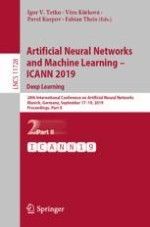2019 | OriginalPaper | Buchkapitel
A Multitask Learning Neural Network for Short-Term Traffic Speed Prediction and Confidence Estimation
verfasst von : Yanyun Tao, Xiang Wang, Yuzhen Zhang
Erschienen in: Artificial Neural Networks and Machine Learning – ICANN 2019: Deep Learning
Aktivieren Sie unsere intelligente Suche, um passende Fachinhalte oder Patente zu finden.
Wählen Sie Textabschnitte aus um mit Künstlicher Intelligenz passenden Patente zu finden. powered by
Markieren Sie Textabschnitte, um KI-gestützt weitere passende Inhalte zu finden. powered by
